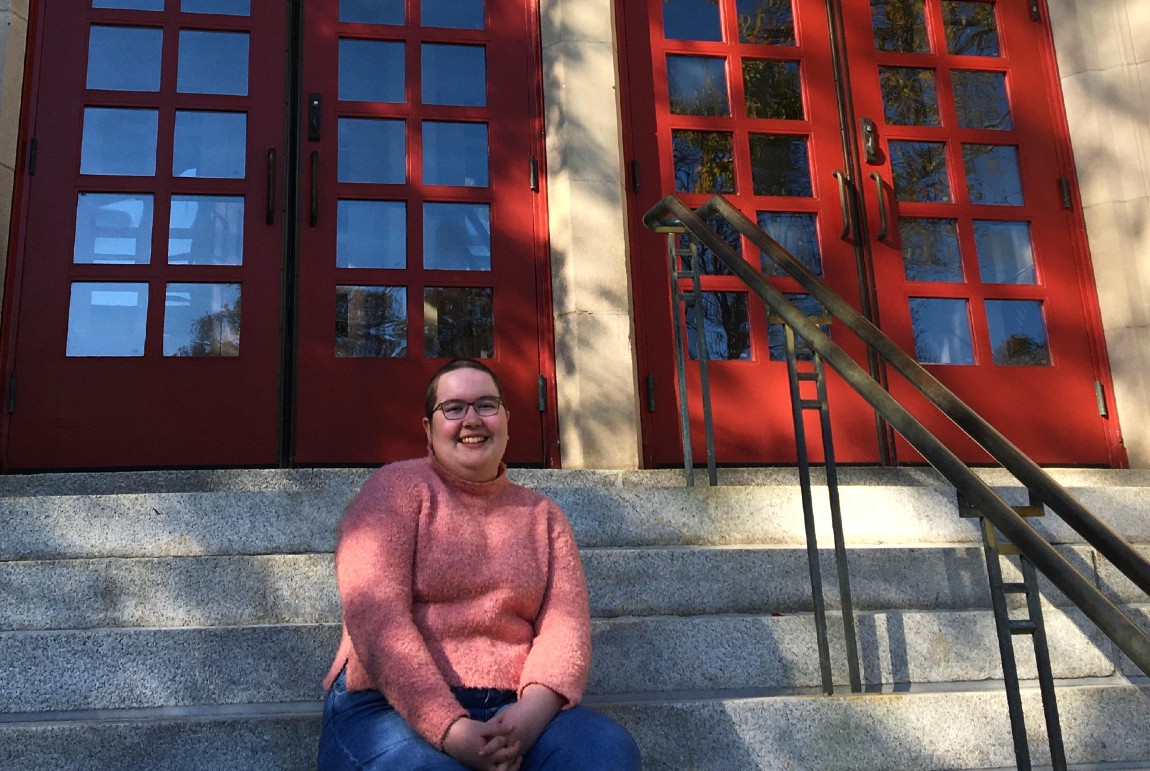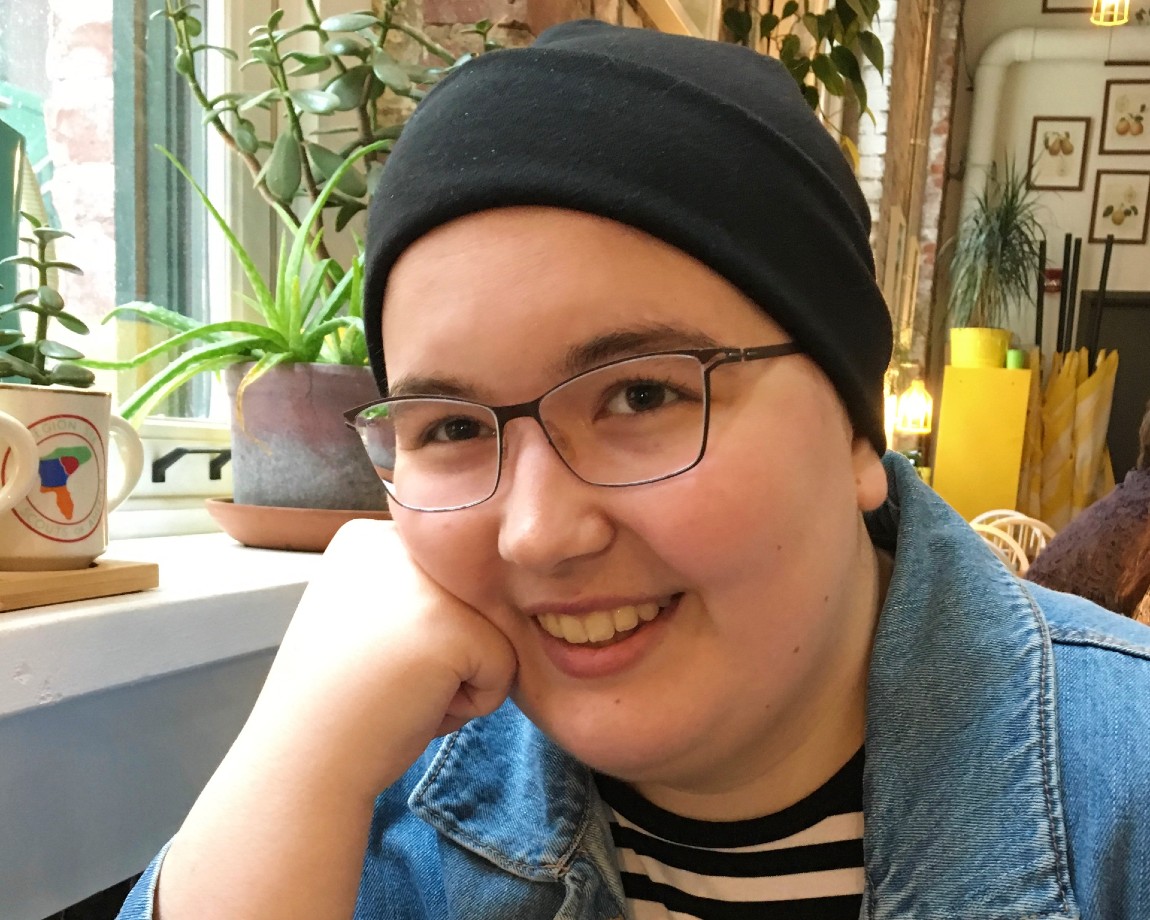Trace, Detect and Dispatch
The poetic travails of Taylor Garrison ‘20 lead to a prestigious fellowship triumph.By: Kristine Yahna Todaro Friday, July 10, 2020 08:28 AM
oppenheimer wore a suit & tie to the beautiful desert.
reading john donne to pre-crackled air. batter my heart,
three person’d god. see the world, seconds before it changes.
quick kit fox, vulpes macrotis, in the sagebrush. wide ears hear
each rip in the atmosphere. later, feasting on all the dead.
accustomed to birds tumbling from the sky.
tracer & detector, the nurse reminds me that even hours
after the test i’ll be radioactive. to avoid pregnant women.
no thought to my own body. they inject it through a needle.
some cried, some cheered. but they all remarked on his strut.
later, oppenheimer only complains about the second bomb.
the cancer that kills him couldn’t be seen like mine.
So begins the poem, “a brief history of nuclear physics,” by Taylor Garrison ‘20 which intermingles the experiences of J. Robert Oppenheimer, the father of the atomic bomb, with her own. Oppenheimer died of throat cancer in 1967, but a Positron Emission Tomography (PET scan), which uses radioactive tracers to map cancer cells, helped Garrison’s life begin anew.

In the spring of 2019, Garrison found herself in a dark place, feeling sick and plagued with a nagging cough that doctors initially attributed to allergies. A scan to check for pneumonia revealed Non-Hodgkin’s Lymphoma behind the breastbone in her chest. She spent last spring and summer in and out of the hospital, getting painful treatments to boost her white blood count and struggling to type or hold a pen due to neuropathy. Garrison was able to complete her spring 2019 finals only a week before heading back to Muhlenberg in the fall. A month later, she got the great news that she was in remission.
Shortly after, she wrote an entire poetry chapbook on her cancer and all the emotions that came with it. “I saw everything in a new light,” says Garrison. “Writing really helped me process what happened, some poems are questioning, some are about my anger and frustration. I never really wrote about medicine or technology until I got sick but cancer changes how you think about everything.”
Several of those poems, including “a brief history of nuclear physics,” were included in her application to the renowned Bucknell Seminar for Undergraduate Poets, which provides writing and mentorship fellowships to twelve undergraduate poets from around the country for three weeks each June. An indicator of the brighter track Garrison’s life is now taking, she won a coveted fellowship spot and the poem was published recently in The Adroit Journal.
Although the in-person program was canceled this year due to the pandemic, Garrison says she and her fellow recipients (called Junies) connected virtually through weekly workshops. The Bucknell poetry faculty and visiting poets provided support despite the cancelation, reaching out to the Junies and offering workshops. Previously, only two Muhlenberg students, Kate O'Donoghue ‘17 and Matthew Hittinger ‘00, had been selected for the fellowship.
“Being accepted was a huge honor and very validating because poetry is just a part of what I’m studying at school and what I love,” says Garrison, adding, “The established poets reaching out is a really wonderful gift that stems from it.”

“Her poems move me,” says Dawn Lonsinger, assistant professor of English, and a former Junie herself. She had Garrison in four classes, chose her as a research assistant on a nonfiction book and worked closely with her on the campus literary magazine, Muses, of which Garrison is one of the poetry editors.
“Taylor’s poems do not align themselves with incantation or bravado; instead, they are full of quieter truths, vivid scenes, the revelations that come to us only through the elemental forces, and questions that seem to bloom to the ends of the earth,” says Lonsinger. “Her poems emerge from her intense focus, her listening for-and-to nuance, her love of consonant details, and paradoxically of the illegibility of most of what we experience while here on Earth. She’s drawn to ecopoetics, the ruckus of the body, science, the fierceness of myth, history, animality, the hum of the truly relational, the turbulence and stitching of narrative, our modern loneliness, the elegiac quality of landscape, and the ways the mind moves with and through these scrims.”
With a history major and minors in both creative writing and political science, Garrison often ties these divergent yet complementary fields together in her poetry. “I think things that exist in history are parts of poems already because history is so strange and unexpected,” she says. “I'm often scribbling down what the professor says in history class because it’s like poetry.”
Garrison, who will apply to Ph.D. programs in history after taking a gap year, received highest honors for her thesis on courtship in antebellum America, mentored by Lynda Yankaskas, associate professor of history. The thesis focused on how couples contended with the norms of courtship in their love letters “so I read etiquette books from the period and tons of love letters which was amazing,” she says. She notes that it also expanded the scholarship of the couples she studied, especially non-straight and couples of color.
Garrison says her professors and classmates have been extremely supportive throughout her ordeal, some sitting with her during her long days spent in the hospital. She was flattered when Professor Yankaskas encouraged her to speak about her poem, “Ode to Sybil Ludington,” below, during the last meeting of her history Culminating Undergraduate Experience (CUE) course in May.
She says the poem, first published in Not Very Quiet in March, arose from her frustration about women’s history and “the stories that are mistold or not told at all. Through my poetry, I’m trying to defamiliarize readers about the stories we’ve been told. Women are often forgotten by history, intentionally or unintentionally, and it’s been a goal through my honors thesis and through my poems and creative writing to give these stories their own space on a page.”
Ode to Sybil Ludington
Sixteen-year-old girl who rode nearly 40 miles down unfamiliar roads in order to rouse sleeping militiamen at the beginning of the American Revolution.
history let it happen/ forty billion invisible hands
the swift bend of a silversmith / wet fingers on a glass rim /
will always hear the whistle / they are looking for /
a non-circling / vulture still sniffs at the air /
say you were a girl just sixteen / say you volunteered /
say you rode ten miles by the time your father called out /
blue-coated & red-faced / there is no bell tower /
no plinking rhythm / to settle in to /
George Washington wrote you / congratulated & praised you /
licked your stamp / clean / because he liked the taste /
now even the Daughters have abandoned /
you / a wild horse / no one chooses to believe in
